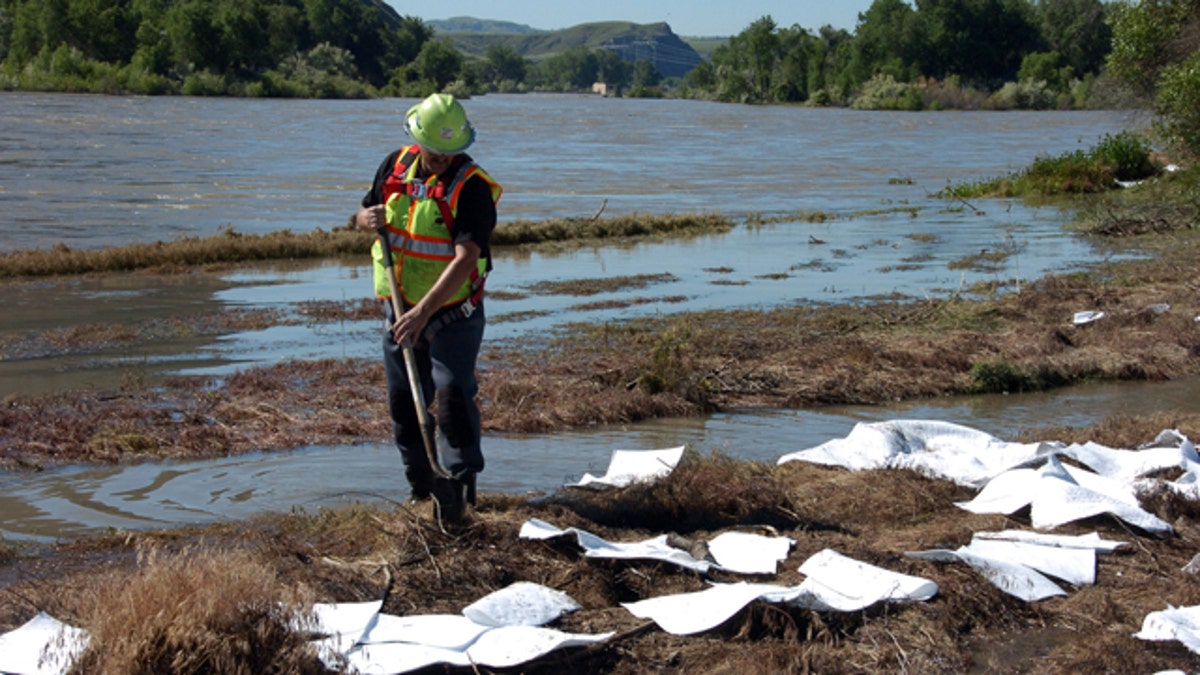
July 3: An ExxonMobil contractor cleans up oil along the banks of the Yellowstone River in Billings, Mont. (AP)
LAUREL, Mont. – An oil pipeline that spewed tens of thousands of gallons of crude oil into Montana's Yellowstone River was temporarily shut down in May because of concerns over rising waters, and regulators twice in the last year warned Exxon Mobil of several safety violations along the line.
Exxon Mobil officials estimated that up to 1,000 barrels, or 42,000 gallons, spilled late Friday night before the flow from the damaged pipeline was stopped. The break near Laurel has fouled miles of riverbank and forced municipalities and irrigation districts to close intakes across eastern Montana.
By early Monday the company had received 70 calls into a hotline set up for property owners suffering from the spill, although spokesman Alan Jeffers said not all of those were reports of oil.
Jeffers said 125 workers were on the ground Monday cleaning up scattered sections of riverbank that received crude. But he added that there was no longer a defined slick of oil moving down the river and the impacts were unlikely to grow.
"It's unlikely there's any oil in the water at this point," Jeffers said. "That doesn't mean we know where it all is."
Officials in Yellowstone County were working with the company to connect cleanup personnel with affected property owner, Commissioner John Ostlund said.
Montana's Disaster and Emergency Services Division was unable early Monday to give an update on the spill, including whether the oil had in fact dissipated. Environmental Protection Agency officials also could not immediately provide any new information.
The 12-inch pipeline, which delivered about 40,000 barrels of crude today to a refinery in Billings, was shut down in May because of concerns over rising waters following heavy rains in Eastern Montana , Exxon Mobil Pipeline Co. president Gary Pruessing said Sunday.
The company decided to restart the line after examining its safety record and deciding the risk was low, he said.
The cause of the spill has not yet been determined, but company and government officials have speculated that high waters in recent weeks may have scoured the river bottom and exposed the pipeline to debris that could have damaged the pipe. Eastern Montana received record rainfall in the last month and also has a huge snowpack in the mountains that is melting, which has resulted in widespread flooding.
"We are very curious about what may have happened at the bottom of the river. We don't have that yet," Pruessing said
Exxon Mobil on Monday said only one case of wildlife damage had been reported, which Ostlund said was a goose with oil on it. A local newspaper, the Billings Gazette has run pictures of a turtle and a group of pelicans apparently with oil on them.
A team from International Bird Rescue was due in Montana Monday to help with any wildlife rescues that might arise.
U.S. Fish and Wildlife personnel on the scene referred questions about wildlife impacts to an Exxon spokesman.
State officials said the long-term concern was a disruption to the smaller organisms in the river that larger fish and birds depend on for their food supply.
The U.S. Department of Transportation, which oversees pipelines, in July notified Exxon Mobil of seven potential safety violations and other problems along the ruptured Silvertip pipeline. Two of the warnings faulted the company for its emergency response and pipeline corrosion training.
Transportation department spokeswoman Patricia Klinger said the company has since responded to the warnings and the case was closed.
The company was also cited for "probable violations" in a letter in February. Those included inadequate pipeline markers in a housing development, a section of pipeline over a ditch covered with potentially damaging material and debris, vegetation in housing area covering a portion of line that prevented aerial inspections, and a line over a canal not properly protected against corrosion.
The company responded in a March letter that it had corrected all of the problems, most of them within a few weeks of being notified.
"These are important things we needed to take care of and we took care of them by the time we got the notice," Jeffers said. No fines were issued, he said.
Pruessing said Sunday that flyovers had shown most of the damage from the weekend's spill has been limited to a 10-mile stretch of river.
But Gov. Brian Schweitzer dismissed Pruessing's estimate as premature. The Democratic governor said Exxon Mobil needed to get more personnel to inspect the situation close-up. He also slammed Pruessing's statement to reporters saying that as of Sunday no injured wildlife had been found.
"For somebody to say at this early stage that there's no damage to wildlife, that's pretty silly," Schweitzer said. "The Yellowstone River is important to us. We've got to have a physical inspection of that river in small boats -- and soon."
EPA spokeswoman Sonya Pennock said its staff had spotted oil at least 40 miles downstream. There were other reports of oil as far as 100 miles away, near the town of Hysham.
The uncertainty frustrated riverfront property owners such as Linda Corbin, who worried that severe damage would be revealed as the flooding Yellowstone recedes in coming weeks. The stench of spilled crude was obvious in Corbin's backyard -- a reminder of the potential problems lurking beneath the surface of the nearby river.
"The smell has been enough to gag a maggot," said Corbin, 64. "I just hope it doesn't come too far because I'm on a well, and I won't appreciate having to shower in Exxon oil."
The spill was small compared to other oil-related disasters, such as the 11 million gallons leaked by the Exxon Valdez in Alaska in 1989. But officials said the pristine nature of the Yellowstone, along with its turbulent waters and riverside communities, complicated their cleanup efforts and attempts to assess the damage.








































